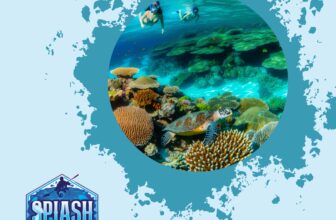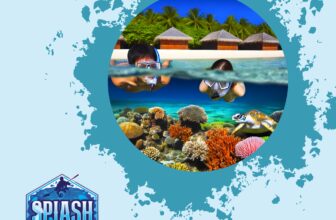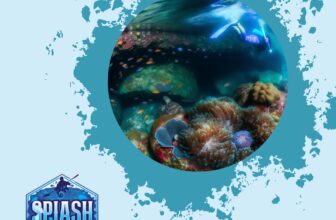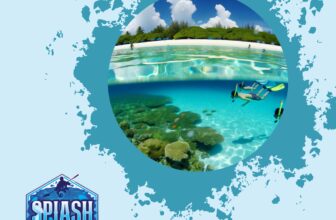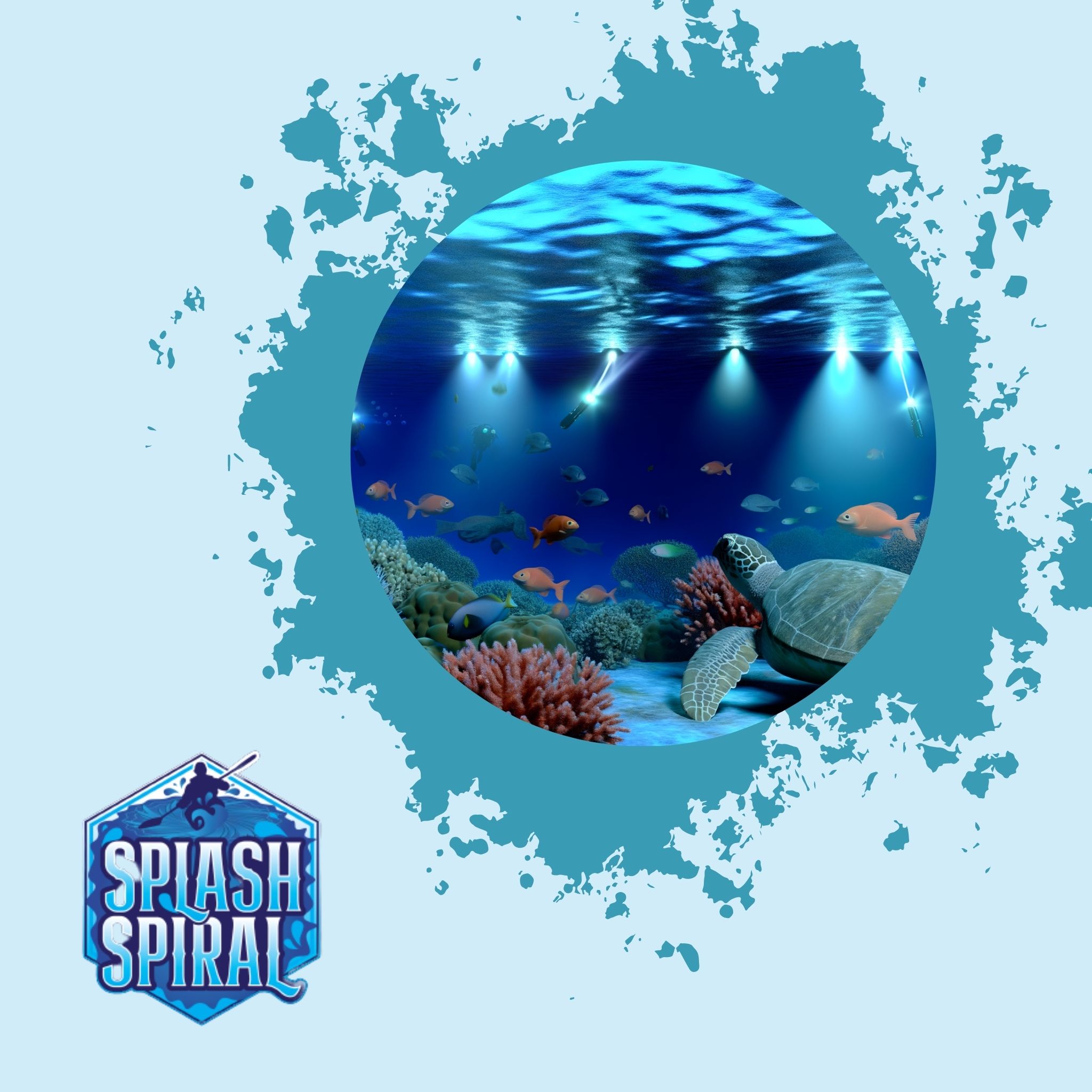
In the shimmering realms of our ocean, a less visible threat looms large — underwater light pollution. As divers, understanding the ripple effects of this phenomenon on marine life and the ecosystem is essential. Let's explore how artificial light interferes with marine environments and what responsibilities divers hold.
Introduction
Underwater light pollution refers to the presence of artificial light in marine environments, a phenomenon that is becoming increasingly common. As urban coasts expand and more underwater activities like night diving and marine tourism become popular, the sources of this pollution multiply. From the lights of coastal developments to the glow emitted by submersible equipment, human activity has introduced new and disruptive light sources into the ocean.
For many aspiring divers, the allure of exploring underwater landscapes is just as captivating as the mystery of night dives. However, it's crucial to recognize that our fascination with the ocean can inadvertently affect it if we are not mindful. Artificial light can disrupt the delicate balance of marine ecosystems, significantly altering the behaviors and habitats of marine species.
As divers, it is our duty to understand these impacts and act responsibly. Awareness is the first step towards conservation. By learning about underwater light pollution and its effects, we can adopt practices that help protect the marine world we so eagerly wish to explore.
What is Underwater Light Pollution?
Underwater light pollution, subtly omnipresent in our marine landscapes, is the introduction of artificial light into aquatic environments where it doesn't naturally occur. Much like its terrestrial counterpart, this pollution stems from human activities and exerts a range of disruptive effects on the ecosystems it infiltrates.
Common sources trace back to coastal developments, such as brightly lit waterfront properties, marinas, and harbors. These places use powerful lights for safety, aesthetics, and practicality, but this light spills into nearby waters creating unintentional havoc. Underwater lighting used in marine activities, such as illuminated dive sites and underwater constructions, also contributes significantly. Modern dive equipment often includes high-powered torches or camera lighting, which, while beneficial for visibility, inadvertently adds to the growing light pollution concern.
With these pervasive sources, it's essential for us divers to grasp the extent of light pollution's reach and consciously mitigate our contributions while exploring the underwater world.
The Environmental Impact of Underwater Light Pollution
Artificial light might seem benign, but it significantly disturbs marine ecosystems. When we flood the dark ocean with light, we're not just brightening our surroundings — we are altering the entire habitat.
Artificial light disrupts the natural cycles of marine life. Nocturnal species, like certain fish and cephalopods, have evolved to thrive in darkness. Light pollution can disorient them, interfere with their mating rituals, and even lead to increased predation. Imagine being a fish that suddenly can't find a safe spot to hide or a mate to dance with. The survival game gets real tough.
Moreover, predator-prey dynamics get thrown off balance. Predatory species that rely on the cover of darkness to hunt find themselves illuminated, making it harder to catch their prey. Conversely, prey species that depend on the night to evade predators suddenly become sitting ducks. This imbalance can lead to unforeseen changes in species populations, potentially causing a ripple effect throughout the ecosystem.
So, what's the takeaway for divers? Understanding these impacts is key. When we dive into their world, we need to do so responsibly, ensuring we're not adding unnecessary stress to the marine environment.
Understanding the Effects on Marine Ecosystems
When artificial light penetrates the ocean's depths, it doesn't just illuminate the surroundings. It disrupts intricate biological processes crucial to the survival of marine life. Imagine the chaos if someone constantly flicked the lights on and off in your bedroom while you were trying to sleep. For marine creatures, the stakes are even higher.
Feeding, mating, and navigation are core activities for marine species, and light pollution can throw these off balance. For instance, certain fish rely on darkness to feel secure enough to venture out and feed. Constant, artificial illumination can scare them into hiding, leading to reduced feeding opportunities and, subsequently, weaker fish populations.
Take the example of sea turtles. These majestic creatures rely on the moonlight to guide their hatchlings to the sea. When artificial lights from beachfront developments outshine the moon, the hatchlings get disoriented, often heading inland instead of toward the ocean. This simple light disruption can lead to higher mortality rates and a decline in sea turtle populations.
Even plankton, those tiny but essential creatures at the bottom of the food chain, aren't immune. They perform vertical migrations based on the natural light cycle. Artificial light can interfere with this rhythm, causing them to stay at depths where they're less likely to be eaten by small fish and other predators. This disruption travels up the food chain, impacting species far removed from the initial source of light pollution.
In short, underwater light pollution throws marine ecosystems into disarray, affecting everything from the smallest plankton to the largest predators. For divers and ocean enthusiasts, understanding these impacts is the first step toward becoming responsible stewards of our underwater worlds.
Diver Awareness and Responsibility
As a diver, you're more than just a visitor to the underwater world; you are a custodian of its delicate balance. The role divers play in mitigating underwater light pollution is paramount. Your actions beneath the waves can have a considerable impact on the ecosystem and its inhabitants.
First, embrace the mindset that every dive is an opportunity to protect as well as explore. This means committing to practices that minimize your light footprint. Use the smallest amount of artificial light necessary to navigate and observe marine life. The less intrusive your lighting, the lower its impact on nocturnal creatures that rely on natural light cycles for feeding and mating.
Adopting best practices during your dives is crucial. For instance, using red filters or low-intensity lights can significantly reduce your light pollution footprint. Red light is less disruptive to marine life because many aquatic organisms are less sensitive to it. This small change can help preserve the natural behavior of marine residents, reducing stress and preventing ecosystem disruptions.
Educating fellow divers is another key responsibility. Share what you've learned about underwater light pollution and its effects on marine life. Encourage others to adopt light-reduction strategies and be mindful of their impact during night dives. Remember, advocacy and awareness within the diving community can lead to broader changes and more significant conservation efforts.
Ultimately, being a responsible diver means constantly weighing your actions against their environmental impact. By making considerate choices and spreading awareness, you contribute to the health and sustainability of our marine ecosystems, ensuring that these vibrant underwater worlds remain flourishing and accessible for future generations. So, dive with care and always strive to leave the ocean as untouched as you found it.
Practical Tips for Minimizing Light Pollution During Dives
Minimizing light pollution during your dives is simpler than you might think, and it can have a profound impact on marine life. Here are some practical tips to get you started:
-
Use the Least Amount of Artificial Light Necessary: When diving at night or exploring darker underwater environments, only use the amount of light you truly need. This helps limit the disturbance to marine species that are sensitive to artificial light.
-
Opt for Red Filters or Low-Intensity Lights: Many marine animals are less affected by red light compared to white light. Using red filters or lights with a lower intensity can significantly reduce your light footprint. There are various dive lights available that offer adjustable brightness settings, which can be very useful.
-
Practice Responsible Night Diving Etiquette: When diving at night, be mindful of how you use your lights. Avoid shining your light directly at marine creatures, especially nocturnal species that rely on darkness. Instead, use a more diffuse light or aim your beam away from direct encounters whenever possible.
By incorporating these practices, you will not only enhance your diving experience but also contribute to the preservation of marine ecosystems. Remember, every small action counts, and as divers, we have a responsibility to protect the underwater world we so deeply appreciate.
Collaboration for Ocean Conservation
To tackle underwater light pollution effectively, divers need to team up with marine biologists and conservationists. These experts study the intricate ways in which artificial light impacts marine environments. By collaborating, divers can gain insights into the latest research and conservation strategies.
Partnering with Marine Biologists
Marine biologists are key allies in understanding the nuances of underwater light pollution. They conduct field research, record data, and analyze changes in marine habitats. As a diver, you can support their work by:
- Participating in citizen science projects: Contribute by sharing observations and data.
- Reporting your observations during dives: Inform scientists of any unique findings.
- Adhering to guidelines that minimize ecological disturbances: Follow established protocols to protect marine life.
Joining Conservation Efforts
Conservation organizations play a crucial role in protecting marine ecosystems. These groups often run campaigns, clean-up drives, and educational programs to raise awareness and instill best practices. By getting involved, you can help amplify their impact.
How to Get Involved:
- Volunteer for organized underwater clean-up events: Participate in local or global initiatives.
- Attend workshops or seminars on marine conservation: Educate yourself about current issues and solutions.
- Advocate for policies that protect marine habitats: Engage in community discussions and promote regulatory changes.
Sharing Resources and Actions
Communities thrive on shared knowledge. By spreading the word about underwater light pollution, you can mobilize fellow divers to act responsibly. Utilize social media platforms, diving forums, and local dive shops to disseminate information on:
- The detrimental effects of light pollution: Educate peers and the wider community.
- Practical ways to reduce light usage during dives: Share tips and best practices for minimal impact.
- Success stories from conservation projects: Highlight effective measures and inspire action.
By working together with marine biologists and conservationists, divers can help mitigate the effects of light pollution and contribute to healthier oceans. It’s a united front where every effort counts, every dive matters, and every bit of awareness can lead to substantial change. Let’s dive into action, one illuminated step at a time.
Conclusion
Underwater light pollution is an increasingly pressing issue, quietly altering marine ecosystems in profound ways. As divers, we have both the privilege of exploring these underwater realms and the responsibility to protect them. By understanding the core impacts of light pollution—disrupted biological processes, altered behaviors of marine species, and imbalanced predator-prey relationships—we can take actionable steps to minimize our footprint.
Awareness and proactive responsibility are crucial. Simple practices like using low-intensity lights and red filters, along with responsible night diving, can make a big difference. Let's also strive to educate our peers and collaborate with marine biologists and conservationists for a more significant impact.
The ocean's health hinges on our everyday choices. Stay informed, stay responsible, and dive with a sense of stewardship that contributes to the long-term wellbeing of our marine environments. For those eager to dive into more knowledge and advocacy, explore additional resources and support the collective effort to reduce underwater light pollution.



